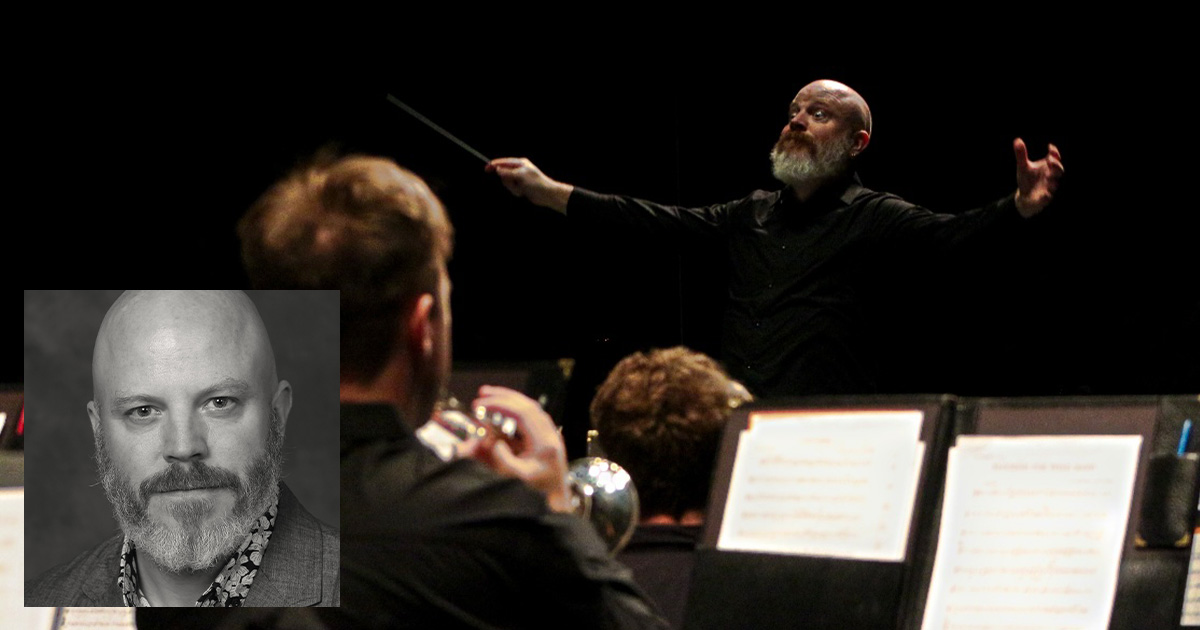Among the many enriching educational experiences students can partake in during their trip with ETI are clinics led by professionals in the field. Whether it’s for bands, orchestras, jazz groups, choirs, theatre groups or otherwise, clinics are incredible ways to motivate students forward in a positive manner, while helping them polish both their ensemble and individual performance skills.
Dr. Benjamin A. Chamberlain, Chair of the Department of Music & Theatre at Xavier University in Cincinnati, Ohio, is one such passionate and informed professional who has led clinics for ETI’s student groups.
Dr. Chamberlain came from a musical family and wonderful music programs in Minnesota’s public schools.
“My mother is a marvelous choir director and I grew up playing jazz in my father’s big band, so I really enjoyed rich opportunities from a young age,” Dr. Chamberlain said. “I’m also a bit of a drum corps enthusiast, having marched and taught in the activity for a number of years.”
Dr. Chamberlain very much enjoys leading clinics with students and finds it thrilling to meet new students who are passionate about making music together.
“There are always great opportunities for students and directors to celebrate successes and to maybe examine some persistent challenges in new ways,” he said. “In all the clinics I’ve done over the past 30 years, it has always been important that each student walk out the door with the exhilaration of new, powerful knowledge and the pride of group success.”
There are always some nerves at the start of a clinic, but Dr. Chamberlain finds that to be completely normal.
“If you don’t have that, you might need to check your pulse!” he joked.
From there, the fun begins.
“When a team has been working hard together for a period of time, they become a kind of living organism,” Dr. Chamberlain explained. “The clinician can really spark excitement when you show them new things they didn’t know they could accomplish together, create new sounds they didn’t know they could make together, and empower them to play with a really strong point of view.
“Bands have been playing Holst for over 100 years, but if you can cultivate within a band a vibrant sense of what they want to say through Holst’s music, then even contemporary audiences can be captivated.”
Dr. Chamberlain likes asking students plenty of questions, such as, “What’s happening in the music here? Which is the most important note in this phrase? Why is this chord here and why is it different there? How do you want the audience to feel during this musical climax?”
He also focuses on getting students to listen and evaluate.
“If I ask them to try something, that’s one thing. If I ask them what they think the music needs, that’s something very different! And the playing changes every time—almost right away!”
For Dr. Chamberlain, listening is where the magic lives.
“If we want students to listen, we have to invite them to listen—to themselves and to each other,” he said, noting that he can immediately hear a group that’s listening to themselves, to their section, and to their ensemble. “And you can very quickly engage a group that’s not listening in these important ways. Students love to listen and evaluate. They love to share what they hear. And then they want to work!”
Dr. Chamberlain’s favorite part of teaching students during these clinics and helping them to improve their music skills are the moments of realization and seeing the lightbulbs going on for students.
“The phone and social media—these things can kill creativity and brainpower, even as they induce stress and depression,” Dr. Chamberlain said. “When we are teaching music, students are fully unplugged from the phone and plugged into the moment. That ‘a-ha!’ lightbulb moment is life-giving.”
It’s a very common experience, Dr. Chamberlain explained, to go into a clinic feeling a bit exposed or vulnerable as a director. The truth? Clinicians have seen it all before.
“No matter what issue might come up, I’ve probably been there,” he said. “I’m just so glad you came and so excited for the time we have to make music. Let’s tackle it together!”
As a clinician, Dr. Chamberlain believes he serves the teacher as much as the students.
“The teacher has invested years of wisdom and musicianship in their students, so I look to reinforce that great teaching at every turn,” he shared. “Teaching is heroic work and I hope I can honor that in a clinic. The successful collaboration between a clinician and a teacher can lead to some profound things; I still use all kinds of things I learned from great teachers and conductors through the years.”
Courtesy of ETI.





